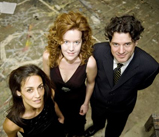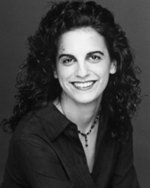Siver Dagger by Stacy Garrop (Written for The Lincoln Trio 2009)
The Lincoln Trio
Desiree Ruhstrat, violin, David Cunliffe, cello, and Marta Aznavoorian, piano
video length 5 min 19 sec
Program note by Stacy garrop
Live recording at the Music Institute of Chicago Nichols Concert Hall, Evanston, IL, USA
Music Institute of Chicago Performance Series
3/21/2010
 Praised for their "joy of sheer technical ability, unanimity of phrasing and beautiful blended tone" the Lincoln Trio has become Chicago’s most celebrated chamber ensemble. The Lincoln Trio - Desirée Ruhstrat, violin, David Cunliffe, cello and Marta Aznavoorian, piano - takes its name from their home, the heartland of the United States, the land of Lincoln. The Trio's polished presentations of well-known chamber works and their ability to forge new paths with contemporary repertoire has led to the group's reputation as a first rate ensemble, drawing an eclectic audience of sophisticated music lovers, young admirers of contemporary programs, and students discovering chamber music for the first time.
Praised for their "joy of sheer technical ability, unanimity of phrasing and beautiful blended tone" the Lincoln Trio has become Chicago’s most celebrated chamber ensemble. The Lincoln Trio - Desirée Ruhstrat, violin, David Cunliffe, cello and Marta Aznavoorian, piano - takes its name from their home, the heartland of the United States, the land of Lincoln. The Trio's polished presentations of well-known chamber works and their ability to forge new paths with contemporary repertoire has led to the group's reputation as a first rate ensemble, drawing an eclectic audience of sophisticated music lovers, young admirers of contemporary programs, and students discovering chamber music for the first time.
Bringing together performing experience spanning the globe, each member is an artist of international renown. Violinist Desirée Ruhstrat has performed throughout the US and Europe, appearing at the White House and performing on live radio broadcast heard around the world with the Berlin Radio Orchestra; cellist David Cunliffe has performed with the BBC and Royal Scottish orchestras as well as touring ad as a member of the Balanescu Quartet; pianist Marta Aznavoorian has appeared with the Chicago Symphony and has performed at the Kennedy Center and the Sydney Opera House.
Formed in 2003, the Trio has performed throughout the United States, including appearances on the Indianapolis Symphony Orchestra’s Beethoven Chamber Music Series, Oakmont Chamber Music Series,the Lane Concert Series at the University of Vermont, Central Texas Orchestral Society, Columbus Chamber Music series, as well as their debut appearance at Ravinia in September of 2008 and a tour on behalf of the Ravinia Festival celebrating the Lincoln Bicentennial, where they kicked off their year in Springfield at the official Abraham Lincoln Birthday Celebration with President Obama. In Chicago they are frequent guests of classical radio station WFMT and have been featured LIVE on WFMT's Impromptu, NEIU's Jewel Box Series with guest violist Roger Chase, the Fazioli Concert Series, Music in the Loft, Unity Temple, and the 28th Anniversary of the Dame Myra Hess Memorial Concert Series.
Champions of new music, the Lincoln Trio has performed numerous compositions written especially for them, including premieres of seven works by members of the Chicago Composers Consortium and "Moon Jig", by composer Augusta Read Thomas during her tenure as the Chicago Symphony Orchestra's composer-in-residence. Staunch proponents of music education as well, the Lincoln Trio is also an ensemble-in-residence at the acclaimed Music Institute of Chicago.
This spring, Cedille Records will release a CD featuring the works of poet Billy Collins, on which the Lincoln Trio performs the world premiere of a new work by Stacy Garrop. The Trio's performance of Pierre Jalbert's Piano Trio for the September 2007 "Composers in the Loft" CD, also on Cedille, was praised by The Strad magazine: "The playing is sensational ... Pierre Jalbert’s Piano Trio (in two parts 'Life Cycle' and 'Agnus Dei') full of Schnittke-like sidling semitones is bewitching, with wonderful sneerings from the cello against insistently jaunty violin and piano, as if yearning to recall some elusive past." The recording was also complimented by the online music magazine, Enjoy the Music: "[Pierre Jalbert's] piece works well as "pure" music, constantly inventive and splendidly played by the Lincoln Trio."
In September 2008 the Lincoln Trio received top prize in the Masterplayers International Music Competition, Venice Italy.



